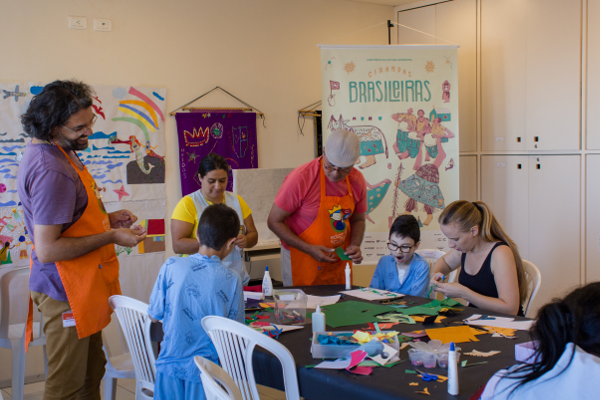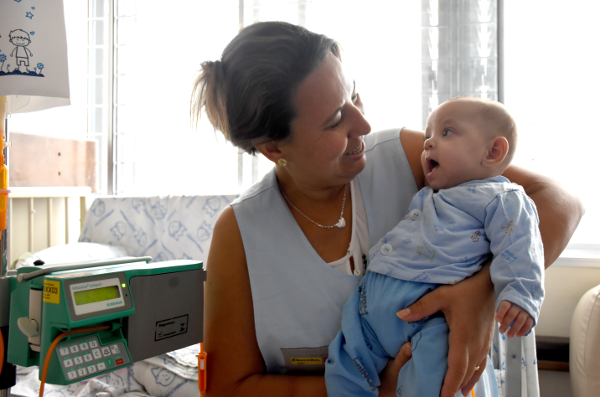An educational hospital
Pequeno Príncipe creates learning opportunities for everyone who comes through its doors, in every place, in all of its forms
.png)
Imagine a school where there aren’t any classrooms or fixed schedules or white boards. The teachers meet the student, whether that’s in a hallway, the hospital square, or even the hospital bed. The class begins in whatever subject the student is willing to talk about and discover. It isn’t an ordinary school. It’s Pequeno Príncipe Hospital – an educational hospital, which creates learning opportunities for every child who comes through its doors, in every place, in all of its forms.
Since the 1980’s, Pequeno Príncipe has been on the forefront of offering its patients access to education during their treatment, in a way that promotes the guarantee of an important right for children and teenagers: the right to education. Not only is this program considered a pioneer, it is also systematized, replicable and complementary to public policies.
Annually, about six thousand classes are held to children and teenagers who receive extended treatment at the Hospital. This way, these patients are able to maintain bonds to their original school and continue their studies while they take care of their health.

This work is coordinated by the Hospital’s Education and Culture Department. As well as its own staff, partnerships with the Municipal and State Secretaries of Education make it possible to provide teachers to tutor the students. In 2017, the department consisted of 21 teachers and educators. The school approval rate of the children who participated in these classes was 80%.
Most of these students are chronic patients who need to be hospitalized for longer periods, such as children and teenagers in the Hematology wing, who need hemodialysis, who are undergoing complex orthopedic treatments or that are waiting for a transplant.
The teacher contacts the patients’ original school to follow the subjects that were being taught. The classes are adjusted to each patient’s individual needs and the challenge of balancing the differences between origin, knowledge and expectation opens new opportunities for innovation. “Each person is unique, but this becomes even more apparent when we talk about education. We work with the goal of valuing each person’s own needs, potential, difficulties and wants,” explains Claudio Teixeira, psychologist and coordinator of the Education and Culture Department.
Cultural feast
Through partnerships with Public Office, companies and cultural producers, Pequeno Príncipe is also able to offer hospitalized patients, their family members and the institution’s staff the access to varied artistic expressions.
.png)
The cultural menu is displayed in the institution’s hallways and consists of a vast schedule that includes musical presentations, theater, dance, art workshops, photography, painting, gardening, storytelling and many other cultural demonstrations. To complete this cultural feast, the library, located on the fifth floor, and mobile carts offer books to everyone. The library was implemented with the support of Swiss watch brand IWC Schaffhausen and the Antoine de Saint-Exupéry Foundation.
A children’s right in Brazil
The Children’s and Teenager’s Statute, established in 1990, reaffirms that all children and teenagers have the right to education and emphasizes the importance of education to create conscious citizens and qualified workers. In 2008, the Ministry of Education released the document “National Policy of Special Education in the perspective of inclusive education,” which includes orientations for educational systems to overcome barriers and mentions education in hospitals.
In Brazil, 6.750 hospital institutions exist but only 156 offer educational assistance. (Teacher Eneida Fonseca, 2015.) Pequeno Príncipe offers educational activities to its staff, health teams, hospitalized children and their families since 1935.
Along with the challenge of treatment and overcoming the disease, it is also important to guarantee the right to education with dignity and respect to contribute to the development of citizens, as well as minimizing the common frustration of not being able to keep up with schoolwork.
More
Pequeno Príncipe: 99 years of pioneering and innovation
Throughout its history, the institution has sought to offer the best to its patients in the field of healthcare. And that is only possible through cientific discoveries and the use of new technologies
Intestinal rehabilitation provides life quality to patients with short bowel syndrome
Children who lost a part of the small intestine turn to oral feeding, thanks to a treatment offered by the Pequeno Príncipe Hospital
Ryan is overcoming short bowel syndrome
The boy lost part of his intestine due to complications after he was born. He was finally able to go home after eight months of treatment
Other Editions
©2026 . Pequeno Príncipe Complex . All Rights Reserved

.png)

.png)




